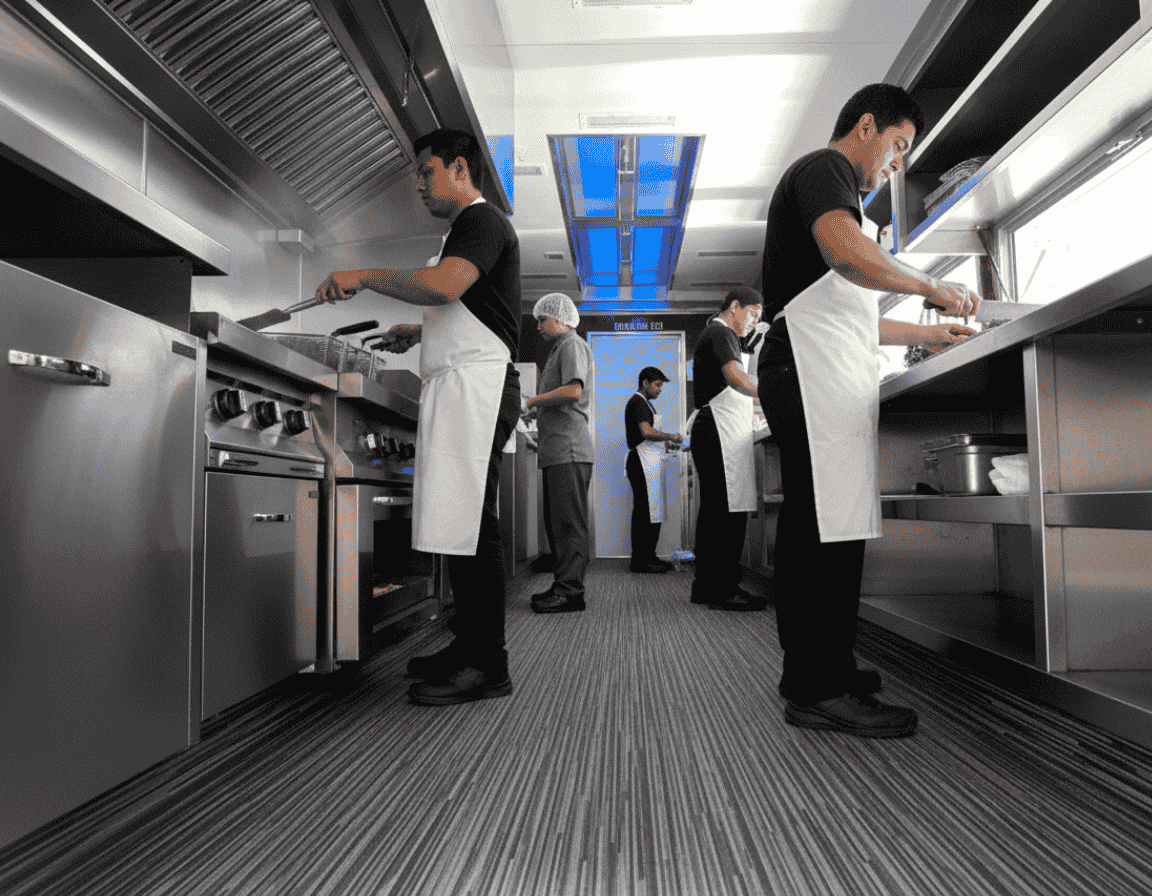How Culinary Coachworks Builds Trailers That Outlast and Outperform
When you walk into a hardware store, do you pick the flimsy hammer or the one with a lifetime warranty? Exactly. I’ve crawled underneath more trailers than I care to admit, and I’ve seen the difference between a cheap box and a well‑built mobile kitchen. At Culinary Coachworks, we treat every build like it’s going on tour. We don’t just weld metal and call it a day—we create kitchens that make your back and bank account happy. Here’s what sets our trailers apart and why they stand up to California’s regulations and long workdays.
Built for Cleanliness and Comfort
Food trailers get messy fast. Grease, crumbs and spilled sauces are part of the job. That’s why we design with cleaning in mind. Rather than using diamond plate flooring that traps grime, we install linoleum surfaces that are easy on your knees and simple to mop. Our cabinets and counters have smooth edges with no hidden crevices for gunk to collect. We mount equipment flush against the wall whenever possible to avoid those dreaded “mystery gaps” where fries disappear forever.
We also prioritize comfort. Quiet, built‑in generators mean you won’t have a clattering box ruining the ambiance outside. We place your prep areas where you naturally turn while working, reducing the number of steps you take each shift. After all, why walk a mile every day when a smart layout can save your feet?
Exceeding Codes and Keeping You Safe
California keeps raising the bar on mobile kitchen safety. For example, Fresno County notes that updated state codes now require mechanical exhaust ventilation and automatic fire‑suppression systems over any equipment producing grease‑laden vapors. We were installing fire suppression before it was cool. Our builds include exhaust hoods, proper spacing around fryers and suppression systems that meet or exceed state standards. You never want to find out the hard way that your extinguisher doesn’t cut it.
We also ensure every piece of equipment is ANSI‑certified and approved by local health departments. According to Los Angeles’ mobile food vending guidelines, all equipment in your truck must be certified by an American National Standards Institute program. We source equipment with proper certifications so you don’t waste time reworking your trailer during inspection.
Custom Layouts for Efficiency
No two menus are alike, and your trailer shouldn’t be either. We build one trailer at a time to ensure each client’s workflow is optimized. If you’re serving burgers, we’ll install refrigeration near the grill. Making smoothies? Your blender needs to live near fresh fruit and sinks. This attention to detail reduces wasted steps and minimizes chaos during rushes. And when you’re ready to expand or modify, our modular designs make it easier to upgrade equipment without tearing apart your entire kitchen.
Materials That Last
I’ve seen trailers built with cheap wood and thin metal that start to warp after a few hot summers. We use marine‑grade plywood, heavy‑gauge steel and high‑end insulation because we’ve learned that skimping on materials costs more in the long run. High‑quality materials also help maintain consistent temperatures, making it easier to pass health inspections and keep your food safe. Remember the commissary rule? Your trailer must visit an approved commissary each day, so it needs to withstand constant travel and cleaning.
Our Support Doesn’t End With the Build
Building a great trailer is only half the job. We guide you through inspections, paperwork and training. Our team knows each county’s specific requirements—like Fresno’s Mobile Round‑Up deadlines and we’ll remind you when to schedule plan checks. We also share real‑world advice on towing, setup and breakdown. Other builders hand you keys and disappear; we stick around because our goal is your long‑term success.
FAQs
-
Absolutely. We design to meet or exceed state and county codes, including mechanical exhaust ventilation and fire‑suppression requirements and ensure all equipment is ANSI‑certified.
-
Yes. We build one trailer at a time, tailoring the layout to your menu and workflow. Modular design allows future upgrades without major demolition.
-
Of course. We assist with inspections, training and troubleshooting. Our job isn’t done until your window is open and customers are lining up.
Quality isn’t just about shiny finishes; it’s about safety, efficiency and longevity. When you invest in a Culinary Coachworks build, you’re getting a kitchen that works as hard as you do and meets California’s toughest standards. Ready to see our craftsmanship? Check out our Custom Trailer Gallery or Contact Frank the Builder to start designing your dream trailer today.


